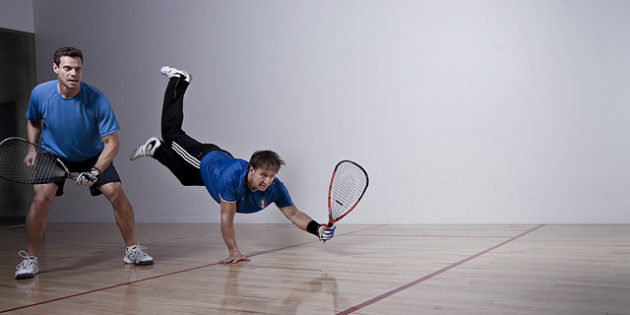Bill figured out how to slow down and stay in the game. The game was racquetball. Bill was one of three pastors with whom I regularly played racquetball at the YMCA in Cedar Rapids, Iowa, back when I was in my mid-30s. Bill was retired. As I near retirement, I find myself still looking up to Bill’s example of slowing down so he could stay in the game.
The source of Bill’s success on the racquetball court was obvious. He was strategic. He played well without needing the energy of a 30-something ball player who frantically ran to and fro, chasing that little blue ball. Somehow, Bill had learn to make the ball come to him. At least, that is what it looked like to me.
Thirty years later, I keep learning from the years when I played racquetball with Bill.
One lesson I am still learning involves the Catch-22 of Strategic Living.
To slow down, you have to figure out how to slow down.
But, to figure out how to slow down, you have to slow down.
Bill didn’t have to run after the ball. He had mastered the art of self-control so he could control the game. To accomplish this, Bill met and overcame the Catch-22 of becoming a great racquetball player. He resolved that he would stop chasing the ball. He came to the conviction that to improve his game, he needed to play smarter, not harder.
They say that to begin a long journey, you have to take the first step. The first step to self-mastery is the most difficult. To grow permanently, we often have to accept defeat temporarily. To change one’s approach probably means losing a few games while you figure out this new approach.
To slow down, slow down. A few balls may zoom past you and hit the wall. A few wins may go to the other team. But, that’s okay. You want to keep your eye on the ball. In this case, “the ball” is your goal to grow, to improve, to find a new way to play the game of life.
The game that has challenged me for nearly four decades is parish ministry. I have always wanted to be the best pastor I could be. For years, that meant running faster and harder, getting up earlier and going to bed later. But, as I get older, I realize what I wish I had realized a long time ago. One can get better without running faster. Less time and effort running around and more time spent slowing down and figuring things out is the better way.
Pastors, are you making time to take days off? Are you using all your vacation weeks? How often are you taking a sabbatical?
No matter how well I think I did when it came to taking time off, my wife and family know the truth of the matter. I have always pushed the envelope, squeezing as much as possible out of my time and my life—for my job.
For years, I attended weekday church meetings until 9:30 pm. I never even asked for a sabbatical, until I had been in the ministry for 34 years! I had more vacation and continuing education time available each year, than I actually used. Why?
Thanks to my friend, Bill, I have a picture in my mind’s eye of what I need and what I want. I can see what it looks like to slow down so you can stay in the game.
Photo: Racquetball Dive! by Edson Hong is licensed under CC by 2.0.

